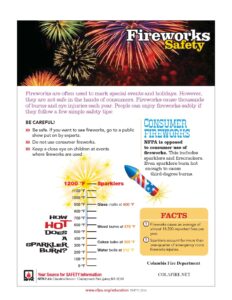
Fireworks can result in severe burns, fractures, or scars or disfigurement that can last a lifetime.
Columbia Fire Chief Aubrey D. Jenkins encourages you this holiday weekend to be safety minded when it comes to fireworks. Amateur fireworks use endangers not only the users, but also bystanders and surrounding property and structures. Pyrotechnic devices ranging from sparklers to aerial rockets cause thousands of fires and serious injuries each year. Fireworks can result in severe burns, fractures, or scars or even death or disfigurement that can last a lifetime. The thousands of serious injuries each year typically harm the eyes, head, or hands, and are mostly reported in states where fireworks are legal. Even sparklers, which are considered by many to be harmless, can reach temperatures of 1,200° F.
The NFPA (National Fire Protection Association) reports that fireworks start an average of 18,500 fires per year, including 1,300 structure fires, 300 vehicle fires, and 16,900 outside and other fires. These fires caused an average of three deaths, 40 civilian injuries, and an average of $43 million in direct property damage.
In 2015, U.S. hospital emergency rooms treated an estimated 11,900 people for fireworks related injuries; 51% of those injuries were to the extremities and 41% were to the head. Children younger than 15 years of age accounted for one-quarter (26%) of the estimated 2015 injuries.
The safest alternative to using amateur fireworks are public fireworks displays, such as Lake Murray’s 4th of July Celebration (https://www.lakemurraycountry.com/things-to-do/events/Lake-Murray-Fireworks-Celebrations) and the Lexington County Peach Festival (http://www.lexingtoncountypeachfestival.com/).
But if you do decide to use amateur fireworks, Chief Jenkins recommends following these fireworks safety tips:
Fireworks Safety Tips:
- Always read and follow labeled directions.
- Have an adult present at all times.
- Never allow children to play, hold or light fireworks.
- Only buy from licensed/permitted dealers.
- Always have water close (a garden hose or a bucket).
- Keep fireworks that are not being used, covered to protect them from accidental fallout from the fireworks display.
- Never throw or point fireworks at other people.
- Never re-light a “dud” firework.
- Never carry fireworks in your pocket.
